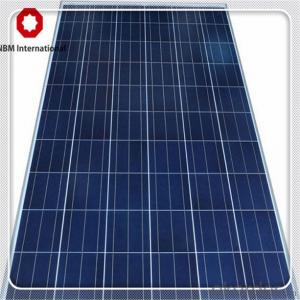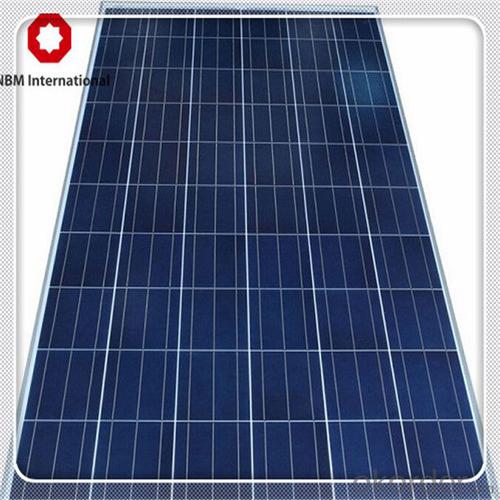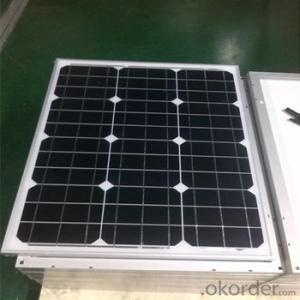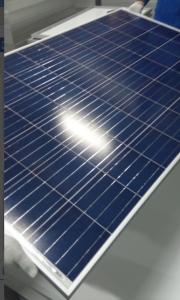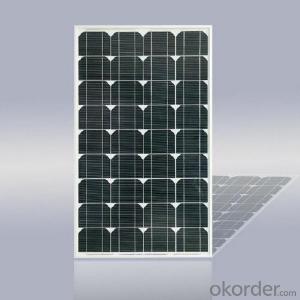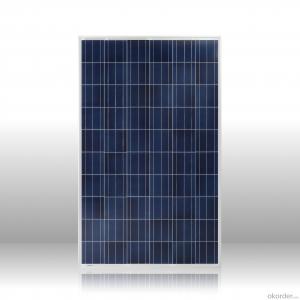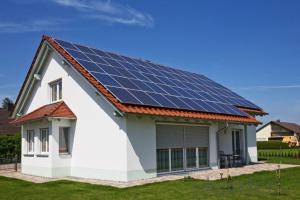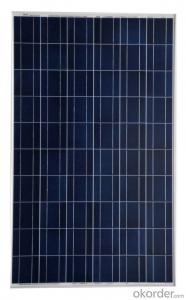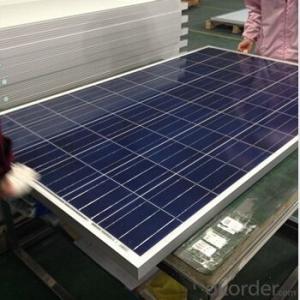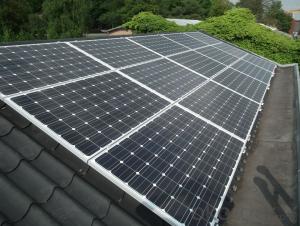250W High Efficiency Poly Solar Panels for Manufactured Homes
- Loading Port:
- China main port
- Payment Terms:
- TT OR LC
- Min Order Qty:
- 250 watt
- Supply Capability:
- 2500000 watt/month
OKorder Service Pledge
OKorder Financial Service
You Might Also Like
1.Product Description
We Offer the mono solar panels 250W 260W 300W, poly solar panels 250W 260W 300W. You can find different mono solar panels and poly solar panels . We are the professional solar panels solar modules supplier.
Solar panels or modules use light energy (photons) from the sun to generate electricity through the photovoltaic effect. The majority of solar panels or modules use wafer-based crystalline silicon cells or thin-film cells based on cadmium telluride or silicon.
Solar panels constitute the solar array of a photovoltaic system that generates and supplies solar electricity in commercial and residential applications. Each solar panel or module is rated by its DC output power under standard test conditions, and typically ranges from 100w to 320 watts. Ground mounted photovoltaic system are usually large, utility-scale solar power plants. Their solar panels or modules are held in place by racks or frames that are attached to ground based mounting supports.
2.Technical Parameter
Model Type | |
Peak Power-Pmax(W) | 185 |
Open Circuit Voltage-Voc(V) | 44.2 |
Maximum Power Voltage-Vmp(V) | 36 |
Short Circuit Current-Isc(A) | 5.4 |
Maximum Power Current-Imp(A) | 5 |
Maximum System Voltage | 1000V DC |
Maximum Series Fuse Rating | 10A |
Power Tolerance | -1~+3% |
Temperature Coefficients of Pmax | -0.45%/℃ |
Temperature Coefficients of Voc | -0.348%/℃ |
Temperature Coefficients of Isc | 0.031%/℃ |
Nominal Operating Cell Temperature | 44.5±2℃ |
Standard Testing Condition(STC) | Irradiance:1000W/m²;Temperature:25℃;AM=1.5 |
Qualification Test Parameters | |
Operating Temperature | -40℃~+85℃ |
Storage Temperature | -40℃~+85℃ |
Pressure Bearing | ≥5400Pascal/m² |
Wind Bearing | ≥5400Pascal/m² |
Mechanical Characteristics | |
Cell Size | Mono 125*125mm±0.5 |
No.of Cells | 72pcs(6*12) |
Dimension | 1580*808*40mm |
Weight | 15.5Kg |
Glass | 3.2mm High Transmission,Low Iron |
Frame | Anodized Aluminum Alloy |
Junction Box | IP65Rated |
Internal Diodes | 3 Bypass Diodes |
Cable | 1*4.0mm² Length 900mm |
3.Production Flow
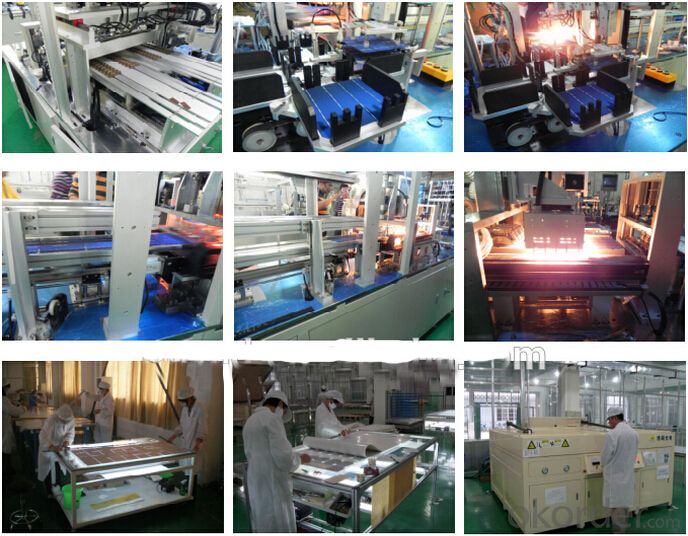
4. Use For
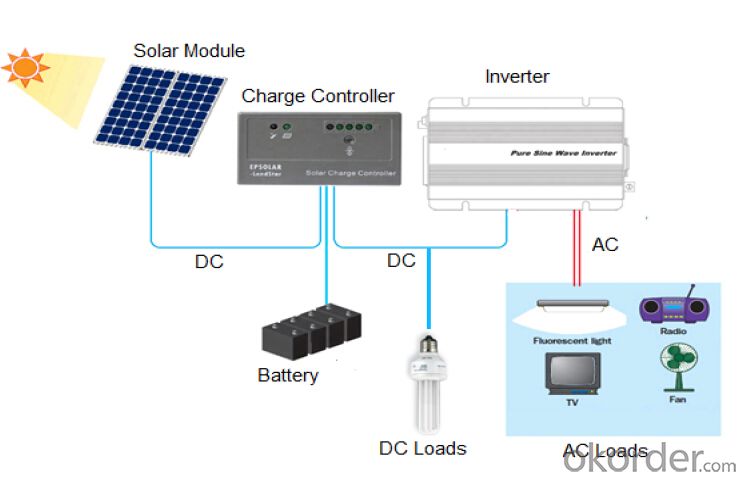
5. Pictures of Product
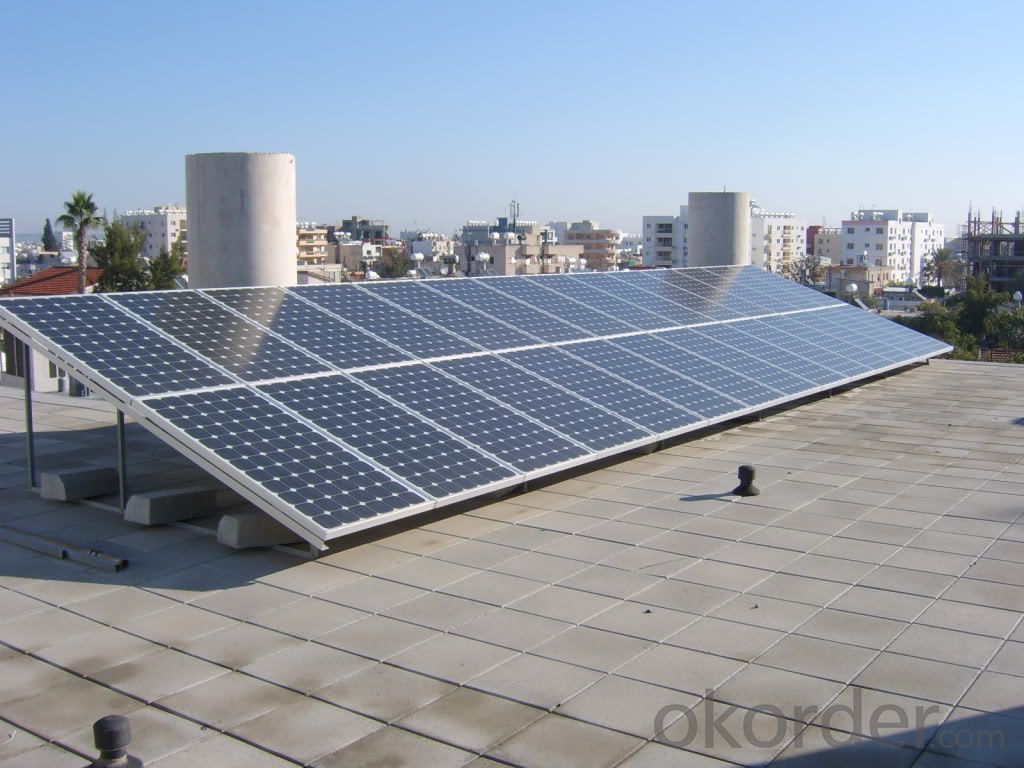
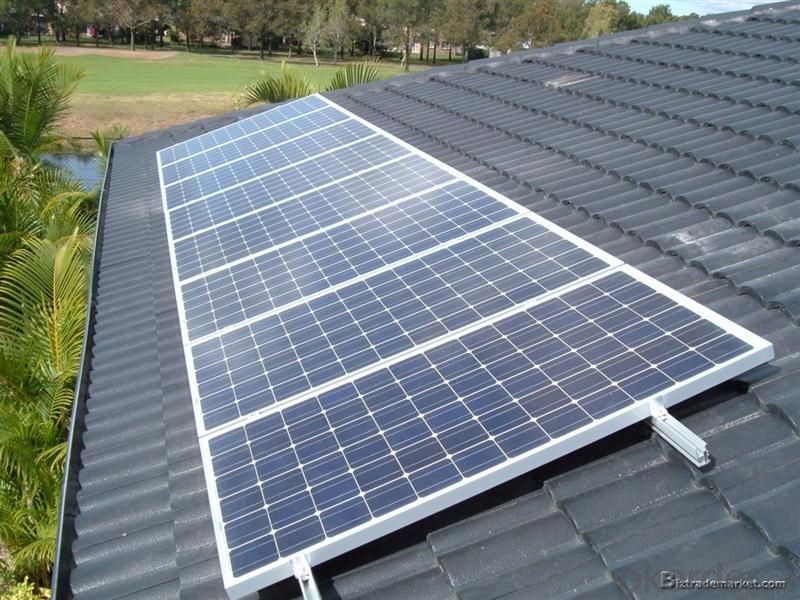
6.FAQ
We have organized several common questions for our clients,may help you sincerely:
1). What’s price per watt?
A: It’s depends on the quantity, delivery date and payment terms of the order. We can talk further about the detail price issue. Our products is high quality with lower price level.
2). Can you tell me the parameter of your solar panels?
We have different series of cells with different power output, both from c-si to a-si. Please take our specification sheet for your reference.
3). How do you pack your products?
We have rich experience on how to pack the panels to make sure the safety on shipment when it arrives at the destination.
4).Can you do OEM for us?
Yes, we can.
- Q: How many solar panels would it take to run an electric motor the needs 480 volts and pulls about 45 to 50 amps?
- It depends on the size of the solar panels you are intending to use for this project. Do a quick search on google and you'll find plenty of information on what you are looking for. Good luck!
- Q: My house uses 500 kw a month, air conditioning is the main consumer, is it possible to install solar panels in my roof to produce this amount, and aproximate cost, thanks .
- There okorder / Why pay thousands of dollars for solar energy ($27,000 average cost) when you can build your own solar panel system for just a fraction of the retail cost. You can build a single solar panel or you can build an entire array of panels to power your whole house. Some people are saving 50% on their power bill, some people are reducing their bill to nothing. But what’s most impressive is that just by following these instructions some are even making the power company pay them!
- Q: Has anyone actually used those kits online like energy4green or earth4energy to build their own solar panels or windmills? I'm so tempted but with my budget can't afford to waste any money. They have a 60 day money back policy but that doesn't include the money used to buy the supplies to try and build the things. My electric bill is almost $300 a month due to my stay at home disabled veteran husband who went from Utah snow to Florida sun and he has to have the AC on really cold. If anyone has actually built one can you tell me of your experience and if it actually is worth the money? I do lots of D.I.Y. projects but am a novice with electric besides installing a ceiling fan and changing out a light switch.
- All okorder
- Q: im interested in starting a solar panel manufacturing company. ive researched on how to make them and it doesnt look too hard, and is definitely something i can figure out. i would be starting from nothing so my question is what are the chances of me actually selling a lot of panels and the business actually succeding?thanks
- At this very moment, most of the people already have an idea on how to create their own solar panels, And creating your own company takes a lot of necessities such as permits ans other stuffs like that,.
- Q: The battery is 9ah and the solar panel is 20w
- despite the statements to the contrary, using a solar panel to charge a battery is not rocket science. first lets look at you panel. panels normally have a spec for open circuit voltage (probably 20 volts for yours) operating power (4.4 volts at .4 amps is usual for 20 watt panel) and short circuit current (probably 2 amps in your case). if this panel is connected to a 2 volt battery, it will develop 20 watts of charge current in full sun. if this panel is connected to a 6 volt battery, it will work closer to the short circuit current or about .8 amps. doing the math this is a 7.2v x ,8= 3 watt charger for 6 volt batteries. while it is less efficient than when working at 2 volts, it will still work pretty good and no regulator is needed if you remember to disconnect the panel after 5 hours of full sun. if you want to walk away and have it run automatically, then you will need to find a 6 volt charge controller.
- Q: How do solar panels affect the value of a home?
- Solar panels can significantly increase the value of a home. They offer long-term cost savings on electricity bills and can generate additional income through net metering or selling excess energy back to the grid. Additionally, solar panels are environmentally friendly, which appeals to many buyers and can make a property more attractive in the market.
- Q: Our school is in the process of being built, but they have no plans to include any environmental benefits. I was wondering how to get a grant for solar panels (at least) or who I can talk to in order to get a grant.
- it quite is attending to be a actual crutch for Republicans isn't this? Cuts in those Bush era very own loan assure courses won't cover / 4 of the expenditures of in simple terms Irene on my own so shall we toss that argument out interior the trash, the place it belongs. this is devoid of going into the expenditures of the Midwest tornadoes, the fires in Texas and their drought, the fires in New Mexico, and the earthquake interior the Mid Atlantic. And greater to come again. in no way formerly in our historic past have we demanded that catastrophe alleviation for our human beings be tied to cuts in courses, and once you're honest, you will see that many different courses are on their slicing block too, lots of them an identical ones they tried to ram down our throats final time they dug of their heels, and seem how super that became out...our credit status went down. Are they loopy to choose greater?
- Q: Does San Francisco get enough sunshine to really make solar panels a viable option for creating a self-supporting home? Certainly a wind turbine would be a good source of energy, but what about solar panels? Does S.F. get enough sunshine to justify using solar panels? It's overcast a lot in the Bay Area, are there any solar panels better than others for a climate like this?
- PV Solar panels all work the same. There aren't any climate specific ones. There is enough sun in San Francisco to produce energy using solar panels however, the the same panels located in a sunnier area will produce more energy. Depending on the size of your system, you will probably need a few more panels than an area that receives more sun to produce the same amount of energy. But they will still produce energy, even on overcast days. The solar installers will make all the calculations to determine what size system you will need to produce as much energy as you want. In California, you don't want to produce more than you consume in a 2 month period because currently, you are not able to sell your excess credits back to PGE after your 2 month cycle. Your system will cost more to produce the same amount of power than my system because I have less overcast days than you do. You will have to make the decision if the cost is worth your while. I expect my system to be totally paid for in around 8-9 years, working in the cost of inflation for electricity. After that, I will be paying nothing for electricty for as long as I stay in my house.
- Q: I want to build a standalone wifi repeater -- powered by the sun. The problem is how much solar power and how big of a battery?net draw 4.5v @ 0.66A with loadnet draw 4.5v @ 0.60A no loadI'm assuming the best choice would be a 6v battery with a a couple diodes in series to induce ~.5v drop. Then, I need something to charge it -- I found 2v 6w solar chargers in the automotive section of Sears and 6v 2w solar chargers in the marine section of Dick's Sporting Goods.How many solar panels and what capacity batteries should I use? Is this the best method or should I use a voltage regulator and go with 2v batteries?I need this to be as cheap and simple as possible...
- I do not know, but there is a house in Lafayette which was built with solar power. It was to have a solar system, so the contractor's first act was to put up a solar array on the property. It had battery backup, and was used to provide the electrical power during construction. during completion of the house the solar system was installed on the roof of the house.
- Q: Ok so my electric bill is through the roof because of the air conditioner (mini-split). Is there any kinds solar panel I can buy at a store and install it myself? Do I need any skills? Which brand? blah...blah...blah...
- Unless you live in an area with a very high UV index, like Las Vegas for example, solar panels are not cost-effective. You definatly should not attempt to install solar power yourself if you intend to power a residence with it (unless you live in a shack). A certified electrician is required in order to connect your equipment to your house's electrical system. It isnt just as simple as a few panels. You need a converter that turns the DC voltage generated into AC. You also need equipment to connect to the metering system for your house. If you want to see if it is cost effective, you will need your electric bills that show usage for a year and the price per kWH. There are a lot of websites that have calculators for solar power systems.
Send your message to us
250W High Efficiency Poly Solar Panels for Manufactured Homes
- Loading Port:
- China main port
- Payment Terms:
- TT OR LC
- Min Order Qty:
- 250 watt
- Supply Capability:
- 2500000 watt/month
OKorder Service Pledge
OKorder Financial Service
Similar products
Hot products
Hot Searches
Related keywords
